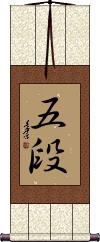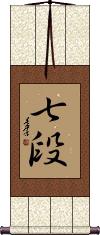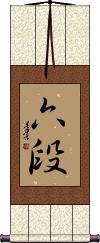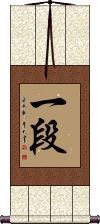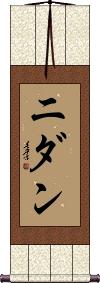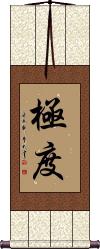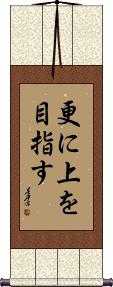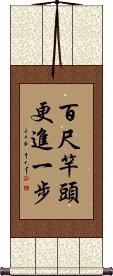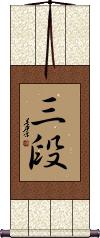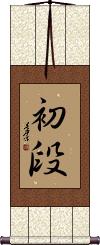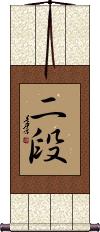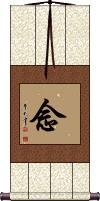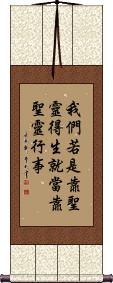Many custom options...
And formats...

Degree in Chinese / Japanese...
Buy a Degree calligraphy wall scroll here!
Personalize your custom “Degree” project by clicking the button next to your favorite “Degree” title below...
1. Go-Dan / 5th Degree Black Belt
2. Nana-Dan / 7th Degree Black Belt
3. Roku-Dan / 6th Degree Black Belt
5. Nidan
8. Even The 100-Foot Bamboo Can Grow One More Foot
9. San-Dan
10. Sho-Dan
11. Ni-Dan
12. Ku-Dan
13. Mindfulness
14. Galatians 5:25
Go-Dan / 5th Degree Black Belt
Nana-Dan / 7th Degree Black Belt
Roku-Dan / 6th Degree Black Belt
六段 is the Japanese title for the 6th Degree or 6th Level.
This applies mostly to martial arts and earning the title of a 6th-degree black belt.
The first character is simply the number 6.
The second character is “dan” which is often translated as “degree” in the context of Japanese martial arts. 六段 means grade, rank, level. When a number is in front like this, it refers to a senior rank in martial arts or games of strategy such as go, shogi, chess, etc.
Ichi-Dan / First Degree
In Japanese martial arts, this usually represents the first-degree black belt rank.
It can also be like a linguistic stair step of “more, much more, still more, all the more.” It can also be a step, rung, level, or rank.
Also sometimes used in the context of Buddhism to mean “first step” or “first stage.” This might presume the first step towards enlightenment etc.
Nidan
Extreme / Intense
極度 means extreme, intense, and sometimes maximum or zenith depending on context.
The first character means extremely or utmost.
The second character means degree or capacity.
Always Try to do Better
This Japanese proverb literally translates as: [After having achieved a fair degree of success,] one should still try to do better.
Others may translate this as “Always try to improve,” or “Always try to be better.”
Note: Because this selection contains some special Japanese Hiragana characters, it should be written by a Japanese calligrapher.
See Also: Never Give Up
Even The 100-Foot Bamboo Can Grow One More Foot
San-Dan
Sho-Dan
Ni-Dan
二段 is a Japanese Kanji word that literally means “second degree.”
二段 is the second black belt rank in Japanese martial arts.
The first Kanji means two or second in Japanese.
The second Kanji means step, grade, rank, or level.
二段 can also be written as 弐段. This version just uses a more complicated Kanji for the number two.
Ku-Dan
Mindfulness
念 is the simplest way to write “mindfulness” in Chinese, Japanese Kanji, and old Korean Hanja.
念 can be defined these ways: To read; to study (a degree course); to read aloud; to miss somebody (keeping them in your mind); idea; remembrance; sense; thought; feeling; desire; concern; attention; recollection; memory; to think on/about; reflect; repeat, intone; a moment.
Obviously, the context in which the character is used determines which definition or meaning is perceived. As a single character, it's open and perhaps ambiguous. Thus, it can be read with any or all of these meanings.
念 is used in a Buddhist context (often written as 正念 or “right mindfulness”) with similar meanings of thought and contemplation.
In Japanese, this character is sometimes used as the name “Nen.”
See Also: Buddhism | Enlightenment
Galatians 5:25
If we live in the Spirit, let us also walk in the Spirit
我們若是靠聖靈得生就當靠聖靈行事 is the translation of Galatians 5:25 into Mandarin Chinese via the Chinese Union Bible.
KJV: If we live in the Spirit, let us also walk in the Spirit.
NIV: Since we live by the Spirit, let us keep in step with the Spirit.
The annotation of this Chinese translation:
1.我们 wǒ men - we / us / ourselves
2.若是 ruò shì - if
3.靠 kào - depend upon / lean on / near / by / against / to support
4.圣灵 shèng líng - Holy Ghost
5.得 děi - to have to / must / ought to / degree or possibility
6.生就 shēng jiù - born one way or another (nervous, suspicious, etc.)
7.当 dàng - suitable / adequate / fitting / proper
8.靠 kào - depend upon / lean on / near / by / against / to support
9.圣灵 shèng líng - Holy Ghost
10.行事 xíng shì - how one does things / how one runs things (in this case, it suggests, “to walk in step with”)
Mountain Travels Poem by Dumu
This poem was written almost 1200 years ago during the Tang dynasty.
It depicts traveling up a place known as Cold Mountain, where some hearty people have built their homes. The traveler is overwhelmed by the beauty of the turning leaves of the maple forest that surrounds him just as night overtakes the day, and darkness prevails. His heart implores him to stop, and take in all of the beauty around him.
First, before you get to the full translation, I must tell you that Chinese poetry is a lot different than what we have in the west. Chinese words simply don't rhyme in the same way that English or other western languages do. Chinese poetry depends on rhythm and a certain beat of repeated numbers of characters.
I have done my best to translate this poem keeping a certain feel of the original poet. But some of the original beauty of the poem in its original Chinese will be lost in translation.
Far away on Cold Mountain, a stone path leads upwards.
Among white clouds, people's homes reside.
Stopping my carriage I must, as to admire the maple forest at nights fall.
In awe of autumn leaves showing more red than even flowers of early spring.
Hopefully, this poem will remind you to stop, and “take it all in” as you travel through life.
The poet's name is “Du Mu” in Chinese that is: ![]()
![]() .
.
The title of the poem, “Mountain Travels” is: ![]()
![]()
You can have the title, poet's name, and even “Tang Dynasty” written as an inscription on your custom wall scroll if you like.
More about the poet:
Dumu lived from 803-852 AD and was a leading Chinese poet during the later part of the Tang dynasty.
He was born in Chang'an, a city in central China and the former capital of the ancient Chinese empire in 221-206 BC. In present-day China, his birthplace is currently known as Xi'an, the home of the Terracotta Soldiers.
He was awarded his Jinshi degree (an exam administered by the emperor's court which leads to becoming an official of the court) at the age of 25 and went on to hold many official positions over the years. However, he never achieved a high rank, apparently because of some disputes between various factions, and his family's criticism of the government. His last post in the court was his appointment to the office of Secretariat Drafter.
During his life, he wrote scores of narrative poems, as well as a commentary on the Art of War and many letters of advice to high officials.
His poems were often very realistic and often depicted everyday life. He wrote poems about everything, from drinking beer in a tavern to weepy poems about lost love.
The thing that strikes you most is the fact even after 1200 years, not much has changed about the beauty of nature, toils, and troubles of love and beer drinking.
These search terms might be related to Degree:
A Journey of 1000 Miles Begins With a Single Step
Brief and to the Point
Highest Quality / Top Notch
Mark
Mark the Boat to Find the Lost Sword / Ignoring the Changing Circumstances of the World
Mark-Anthony
Warriors: Quality Over Quantity
The following table may be helpful for those studying Chinese or Japanese...
| Title | Characters | Romaji (Romanized Japanese) | Various forms of Romanized Chinese | |
| Go-Dan 5th Degree Black Belt | 五段 | go dan / godan | ||
| Nana-Dan 7th Degree Black Belt | 七段 | nana dan / nanadan | ||
| Roku-Dan 6th Degree Black Belt | 六段 | roku dan / rokudan | ||
| Ichi-Dan First Degree | 一段 | ichi dan / ichidan | yī duàn / yi1 duan4 / yi duan / yiduan | i tuan / ituan |
| Nidan | ニダン | nidan | ||
| Extreme Intense | 極度 极度 | kyokudo | jí dù / ji2 du4 / ji du / jidu | chi tu / chitu |
| Always Try to do Better | 更に上を目指す | sara ni ue o me za su saraniueomezasu | ||
| Even The 100-Foot Bamboo Can Grow One More Foot | 百尺竿頭更進一步 百尺竿头更进一步 | bǎi chǐ gān tóu gèng jìng yī bù bai3 chi3 gan1 tou2 geng4 jing4 yi1 bu4 bai chi gan tou geng jing yi bu baichigantougengjingyibu | pai ch`ih kan t`ou keng ching i pu pai chih kan tou keng ching i pu |
|
| San-Dan | 三段 | san dan / sandan | ||
| Sho-Dan | 初段 | sho dan / shodan | ||
| Ni-Dan | 二段 | ni dan / nidan | ||
| Ku-Dan | 九段 | ku dan / kudan | ||
| Mindfulness | 念 | nen | niàn / nian4 / nian | nien |
| Galatians 5:25 | 我們若是靠聖靈得生就當靠聖靈行事 我们若是靠圣灵得生就当靠圣灵行事 | wǒ men ruò shì kào shèng líng shēn jiù dāng kào shèng líng xíng shì wo3 men ruo4 shi4 kao4 sheng4 ling2 dei3 shen1 jiu4 dang1 kao4 sheng4 ling2 xing2 shi4 wo men ruo shi kao sheng ling dei shen jiu dang kao sheng ling xing shi | wo men jo shih k`ao sheng ling tei shen chiu tang k`ao sheng ling hsing shih wo men jo shih kao sheng ling tei shen chiu tang kao sheng ling hsing shih |
|
| Mountain Travels Poem by Dumu | 遠上寒山石徑斜白雲生處有人家停車坐愛楓林晚霜葉紅於二月花 远上寒山石径斜白云生处有人家停车坐爱枫林晚霜叶红于二月花 | yuǎn shàng hán shān shí jìng xiá bái yún shēng chù yǒu rén jiā tíng chē zuò ài fēng lín wǎn shuàng yè hóng yú èr yuè huā yuan3 shang4 han2 shan1 shi2 jing4 xia2 bai2 yun2 sheng1 chu4 you3 ren2 jia1 ting2 che1 zuo4 ai4 feng1 lin2 wan3 shuang4 ye4 hong2 yu2 er4 yue4 hua1 yuan shang han shan shi jing xia bai yun sheng chu you ren jia ting che zuo ai feng lin wan shuang ye hong yu er yue hua | yüan shang han shan shih ching hsia pai yün sheng ch`u yu jen chia t`ing ch`e tso ai feng lin wan shuang yeh hung yü erh yüeh hua yüan shang han shan shih ching hsia pai yün sheng chu yu jen chia ting che tso ai feng lin wan shuang yeh hung yü erh yüeh hua |
|
| In some entries above you will see that characters have different versions above and below a line. In these cases, the characters above the line are Traditional Chinese, while the ones below are Simplified Chinese. | ||||
Successful Chinese Character and Japanese Kanji calligraphy searches within the last few hours...
